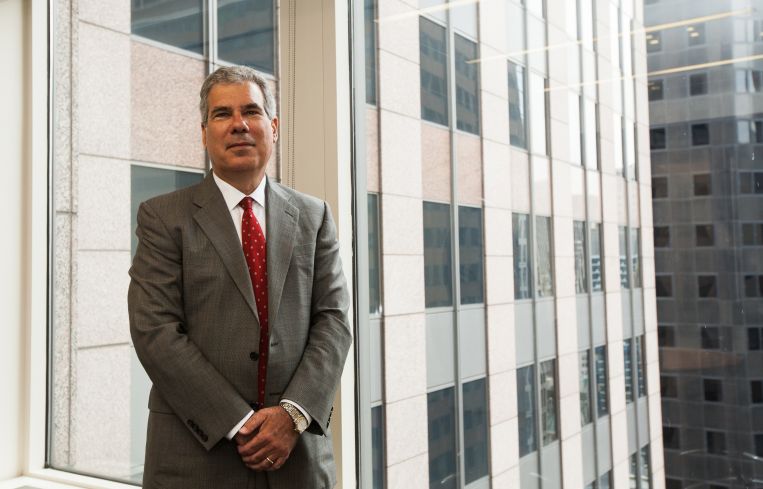Kramer Levin’s Neil Tucker Talks Foreclosures, Bankruptcies and Air Rights
By Liam La Guerre September 11, 2015 9:00 am
reprints
Neil Tucker, a partner in the real estate group at Kramer Levin Naftalis & Frankel, has been with the global law firm since 1998. Mr. Tucker, who grew up in Queens, N.Y., represents institutional investors, developers, tenants, hedge funds and private equity firms in transactions including building sales, development projects and loan restructurings.
Commercial Observer: You’ve worked with developers on assembling and utilizing air rights. Has that become more competitive?
Mr. Tucker: Absolutely. It’s very competitive, but it’s also very difficult. You’ve got to have a lot of patience, and you’ve got to be a little lucky I think. It’s not so much that people are competing for the same specific air rights, but rather I think it’s that people are trying to become very creative in carving out spaces where a development site could be or development could be achieved where years ago you wouldn’t have thought it could be a larger development site—mid-block for example. You didn’t usually see large and tall buildings developed in mid-blocks and now you are seeing that. That’s where people can find the footprint and the excess air rights that they need.
Who are the winners and losers in those cases?
The winners are the same people who have been winning for the last couple of years. I think you have to move very quickly. You also have to be willing to be patient and I think you have to know what you are doing. It’s not for the faint of heart and as a consequence of that, it’s largely a similar cast of characters. Because if you want to break into this industry, that particular part of the industry is not very easy.
You led the team that represented The Continuum Company in its purchase of 45 East 22nd Street for a 65-story condominium. What was the most challenging part of that project?
I think there were two, because there were two parts to the deal. The first part of the deal was assembling the sites and the air rights. The client did an excellent job of being patient and assembling a large number of air right parcels. But as a consequence to that we had to have seven or eight concurrent closings all happening on the same day including an acquisition loan. And to get it happening all at the exact same moment—a lender, seven or eight sellers and us all at the same moment in time saying, “O.K.”—was quite the trouble. I’ll have to say, in my legal career, that was certainly one of the more difficult afternoons.
You also have a lot of experience working on loan restructuring, workouts, foreclosures and bankruptcies. With the U.S. economy and U.S. real estate market continuing to perform so well, are you still seeing a significant amount of deals in need of triage?
The answer is definitely no. I think low interest rates have saved some projects that might have been on the edge. I think prices are still very high. I think we have—depending on the market—12 or 18 months before some projects start to need that help again. But at the moment there is very little work in restructuring real estate transactions.
What’s the biggest bankruptcy or foreclosure case you’ve worked on or witnessed in the past year?
Our firm is involved significantly in the Caesars Entertainment bankruptcy and there are obviously lots of real estate-related issues. That is a very complex transaction that we are working on now, but it’s also obviously not only about real estate foreclosures.
There has been a lot of talk of another downturn hitting the U.S. economy by 2020. Is this something you’re worried about?
Yes. I’m worried about it on behalf of our clients. If you buy a property today and you have a long-term hold outlook of 10 years or so, then no, I don’t worry. If you buy a property today and you are part of a private equity fund and you have a three- to five-year time horizon before you want to flip that property, yes, I worry about that. I think private equity funds buying real estate today with a fairly short time horizon could be caught up in problems in three or four years.
What does that mean for you as a real estate attorney?
It’s an interesting question. I think most people who become real estate lawyers like doing deals. I’m speaking for myself and I can speak for my partners—we like doing deals. When you are looking at a poor economy and there are restructurings and foreclosures as we were just talking about, particularly restructurings, it’s a deal at some level but it’s a deal where people aren’t happy. And that makes for a tougher day at the office, frankly.
It may be less of a race to get deals closed, because things move a little more slowly in restructurings usually. But at the same time there is more of an adversarial relationship. You borrowed money, and you can’t pay it back. That’s different than a relationship where you are trying to borrow money and a lender wants to give you money. When you close a deal when someone is buying or selling, everyone’s happy. When you close a restructuring, no one is saying any congratulations.



